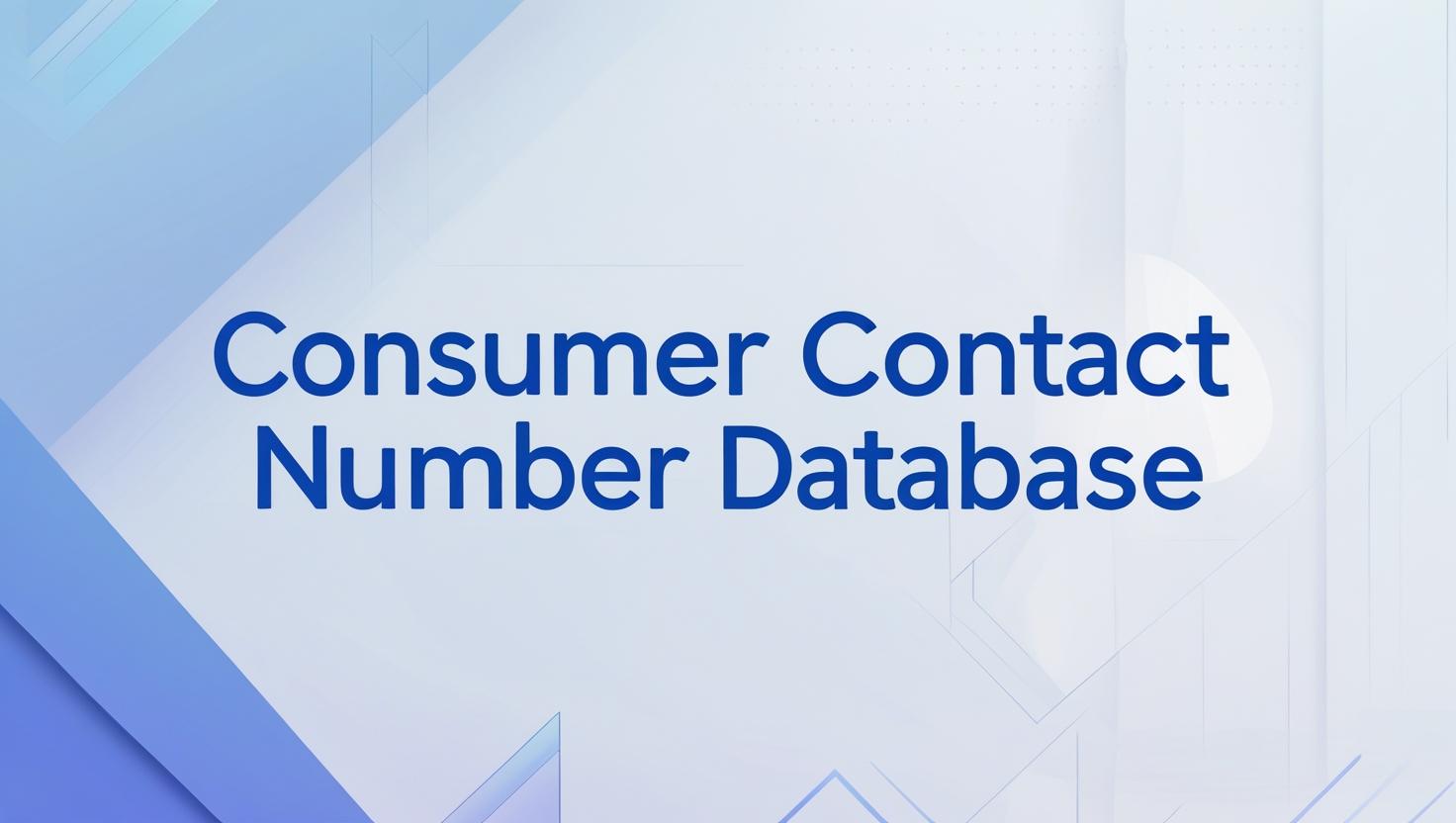Have you ever wondered why a company calls you right after you look at their website? Or why you get a text message about a product you were thinking of buying? The answer is often a “consumer contact number database.” It’s not magic. It’s simply a very organized list of people’s information. This article will explain what these databases are and how they work.
What Is a Consumer Contact Database?
Imagine you have a notebook. In this notebook, you write down the names and phone numbers of all your friends. You also write notes next to each name, like what they like to do or what their favorite food is. A consumer contact database is like that notebook, but for a business. It’s a huge digital file that stores information about customers and people who might become customers.
This database doesn’t just hold phone numbers. It can also contain names, email addresses, and even a person’s birthday. It might also have notes about what they bought before or what they have shown interest in. Businesses use this information to talk to people in a more personal way. They can send a special birthday offer or a message about a product they know you will like.
The main goal of a consumer contact database is to keep all customer information in one place. This makes it easy for different parts of a company to find what they need. For example, the sales team can see what a customer bought. The customer service team can see what problems a customer had. This helps them provide better service.
It is important for businesses to keep this information safe. They use special security to protect all the data in their databases. They want to make sure that a customer’s private information, like their phone number, stays private.
Why Businesses Create These Databases
Businesses need to talk to their customers. A contact database helps them do this in an organized way. Think about a big company with thousands of customers. It would be impossible to remember every person. The database acts as a memory for the company. It helps them keep track of every person they have ever talked to.
Creating a good database is like planting a garden. You have to prepare the soil and water the plants. A business has to collect the right information and keep it updated. A well-organized database helps a business grow because it makes their communication more effective. It also helps them save money by not wasting time on people who are not interested.
This system is much more efficient than using scattered notes or different spreadsheets. It makes sure that everyone in the company has the same information. This stops confusion and helps the company work smoothly. Without a good database, a business can lose track of its customers and opportunities. This can make it difficult for them to grow.
How Do Companies Get Your Number?
You might wonder how a company got your phone number in the first place. The most common way is that you gave it to them. Maybe you signed up for an email newsletter or created an account on their website. Perhaps you filled out a form to get a discount or entered a contest. When you do these things, you are usually giving the company permission to contact you.
However, sometimes businesses get phone numbers from other places. For example, they might buy lists from other companies. This is where things can get a little tricky. If you did not give a company your information directly, it might be a violation of your privacy. It is very important for a business to be careful about this. They must follow the law and be ethical.
They should always get your clear permission before they contact you. For example, they might ask you to check a box that says, “Yes, please send me text messages about special offers.” This is called “opting in.” This gives you control over your information and how it is used.
Similarly, if you do not want to be contacted, you should have an easy way to say “no.” This is called “opting out” or unsubscribing. Most good companies will include an easy way for you to stop receiving their messages. If they do not, it is a big warning sign.
The Big Rules and Laws
Laws about consumer data are becoming very important. These laws, like the GDPR in Europe or the CCPA in California, protect your privacy. They make sure companies handle your information with great care. These laws often say that businesses must be clear about what they are collecting and why. They must also let you see the information they have about you.
If a company breaks these rules, it can face big fines and lose the trust of its customers. This is why most businesses try very hard to follow these rules. They want to show customers that they are trustworthy and respectful.
It is always a good idea to read a company’s privacy policy. This document explains how they will use your information. While they can be long and boring, they tell you a lot about the company’s commitment to your privacy. Knowing your rights as a consumer is a powerful tool in the digital world.
The Benefits of a Good Database
A good consumer database is a great tool. It helps a business in many ways. Firstly, it allows them to send messages that you actually care about. If a company knows you love hiking gear, they will not send you an email about video games. This makes you more likely to open their messages and, possibly, buy something. This is called “personalized marketing.”
Your next customer is just a click away. Get premium email leads now at latest mailing database .
Secondly, a good database helps businesses work more efficiently. Instead of guessing who to call, a sales person can look at the database and know who is most likely to be interested. This saves time and energy for both the company and the customer.

Furthermore, a database helps a company keep its promises. If you bought something and had a problem, the customer service person can see your entire history. They do not need to ask you to repeat your story. This makes the experience much better for you. It shows that the saving smart searches on linkedin navigator company cares and is on top of things.
A clean, up-to-date database also helps a company build stronger relationships with its customers. When you feel a company knows you and cares about your needs, you are more likely to marketing list be a loyal customer. Building this loyalty is extremely valuable for any business.
Ethical Ways to Build a Database
Building a database ethically is the only way to do it correctly. This means getting permission first. Many companies use “opt-in” forms on their websites. This is a very clear way to get a person’s permission. For instance, they might have a small box you must check to join their mailing list.
Another ethical way is to offer something valuable in return for contact information. This is called a “lead magnet.” For example, a company might offer a free e-book or a guide in exchange for your email address. You get something useful, and they get your information with your permission. This is a fair trade.
In addition, companies can collect information from their current customers. When you buy something, the company might ask if you want to join their loyalty program. This is another great way to build a database ethically.
Honesty and transparency are key. A business should always be clear about why it needs your information and what it will do with it. They should not hide this information in tiny, hard-to-read text. They should also make it simple for you to stop getting messages from them at any time. This creates a relationship based on trust.
How to Keep Your Data Safe
As a consumer, you also have a part to play in keeping your data safe. Be careful about who you give your phone number to. When you sign up for a service, read the privacy policy. If it seems too complicated or if you can’t find it, consider not giving them your information.
Moreover, use strong, unique passwords for every account you create. This makes it harder for hackers to access your information. Regularly check your online accounts and delete any old ones you no longer use.
Also, be aware of what is called “phishing.” This is when someone pretends to be a company you know to trick you into giving them your information. A common example is a text message that asks you to click on a link to update your account. Always be suspicious of messages that ask for your private data. Instead, go directly to the company’s official website.
Finally, you can exercise your right to “opt-out.” Most marketing text messages and emails have a way for you to unsubscribe. Use this feature if you no longer want to be contacted. This helps you manage your digital footprint and keeps your data safe.
The Future of Contact Databases
The way companies use contact databases is always changing. Technology is improving, and so are the laws that protect us. In the future, we might see companies using even smarter ways to talk to us. However, the core ideas of consent and privacy will remain very important.
Businesses that respect your data will build more trust and be more successful. Those that are careless with your information will fail. This means that as a consumer, you have more power than ever. By being smart about who you share your information with, you are helping to shape a better, safer digital world for everyone.
This trend toward more ethical and transparent data collection will likely continue. Companies are realizing that trust is a huge part of their brand. When customers trust you, they are more likely to stay with you for a long time. So, the future is likely to be a place where your privacy is more respected than ever before.
